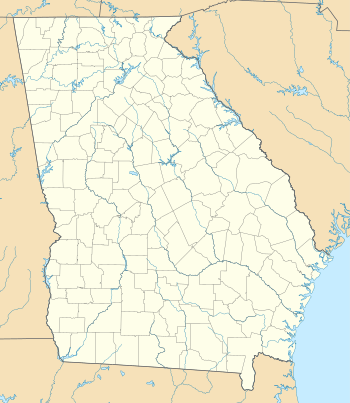Fort Mountain (Murray County, Georgia)
| Fort Mountain GA | |
|---|---|
|
Fort Mountain, viewed from Chatsworth | |
| Highest point | |
| Elevation | 2,850 ft (870 m) |
| Coordinates | 34°46′59″N 84°42′33″W / 34.78306°N 84.70917°WCoordinates: 34°46′59″N 84°42′33″W / 34.78306°N 84.70917°W |
| Geography | |
 Fort Mountain GA | |
|
Fort Mountain | |
  | |
| Nearest city | Chatsworth, Georgia |
|---|---|
| Area | 211.2 acres (85.5 ha) |
| NRHP Reference # | 77001587[1] |
| Added to NRHP | November 23, 1977 |
Fort Mountain is a mountain in northern Georgia, just east of Chatsworth. It is part of the Cohutta Mountains, a small mountain range at the southern end of the Appalachian Mountains. It also lies within the Chattahoochee National Forest.
Fort Mountain takes its name from a peak that has remnants of a stone formation around part of that peak. The stones, which are from the local area around the summit,[2] are piled in an 928 feet (283 m)-long discontinuous zig-zag line.[3] Stone piles may be formed naturally by the thrust that causes a ridge to crest during the mountain's formation.
Early visitors referred to the formation as a fort, speculating that it was built by Hernando de Soto to defend against the Creek Indians around 1540.[4] However, this theory was contradicted as early as 1917, as a historian pointed out that de Soto was in the area for less than two weeks.[5]
The original construction and function of the formation as a fort is less accepted today and its origin remains unknown. The formation has been attributed to pre-Columbian native Americans. Early historians attributed the stone piles to a race of moon-eyed people, said to predate the Cherokee. The earliest known mention of this was by Benjamin Smith Barton (1766-1815).
Around and mostly south of the fort peak is Fort Mountain State Park, with camping and hiking areas, a mountain lake, and a variety of public facilities.
See also
References
- ↑ National Park Service (2010-07-09). "National Register Information System". National Register of Historic Places. National Park Service.
- ↑ Smith, Philip E., "Aboriginal Stone Constructions in the Southern Piedemont", in University Of Georgia Laboratory Of Archaeology Series Report No 4 1962
- ↑ Smith, Philip E., "Aboriginal Stone Constructions in the Southern Piedemont", in University Of Georgia Laboratory Of Archaeology Series Report No 4 1962
- ↑ "News from Georgia" Brick and Clay Record Kenfield, Chicago: 1907, Vol. 27, No.3, 99.
- ↑ Knight, Lucian Lamar, "Fort Mountain," A Standard History of Georgia and Georgians. Lewis Publishing, Chicago: 1917, Vol. 1, p. 14.